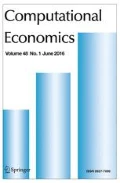References
Axtell, R. (2000). Why agents? On the varied motivation for agent computing in the social sciences. Working Paper No. 17, Center on Social and Economic Dynamics, The Brookings Institution.
Barreteau, O. (2003). Our companion modelling approach. Journal of Artificial Societies and Social Simulation, 6. available at http://jasss.soc.surrey.ac.uk/6/2/1.html
Chattoe E. (2002). Building empirically plausible multi-agent systems: A case study of innovation diffusion. In: Dautenhahn K. (eds) Socially intelligent agents: Creating relationships with computers and robots. Dordrecht, Kluwer
Colander D. (eds) (2007). Post-walrasian macroeconomics. Cambridge, Cambridge University Press
Cowan R., Foray D. (2002). Evolutionary economics and the counterfactual threat: On the nature and role of counterfactual history as an empirical tool in economics. Journal of Evolutionary Economics 12: 539–562
Dawid, H., & Fagiolo, G. (Eds.). (2007). Special issue on “Agent-Based Models for Economic Policy Design”. Journal of Economic Behavior and Organization, forthcoming. Edmonds, B., & Moss, S. (2005). From KISS to KIDS – an ‘anti-simplistic’ modelling approach. In P. Davidsson, B. Logan, & K. Takadama (Eds.), Multi agent based simulation 2004, Vol. 3415, (pp. 130–144) Lecture Notes in Artificial Intelligence, Springer.
Gallegati M., Delli Gatti D., Di Guilmi C., Gaffeo E., Giulioni G., Palestrini A. (2005). A new approach to business fluctuations: Heterogeneous interacting agents, scaling laws and financial fragility. Journal of Economic Behavior and Organization 56: 489–512
Gilbert N. (2004). Open problems in using agent-based models in industrial and labor dynamics. In: Leombruni R., Richiardi M. (eds) Industry and labor dynamics: The agent-based computational approach. World Scientific, Singapore, pp. 401–405
Gilli M., Winker P. (2003). A global optimization heuristic for estimating agent-based models. Computational Statistics and Data Analysis 42: 299–312
Gourieroux C., Monfort A. (1996). Simulation-based econometric methods. Oxford, Oxford University Press
Kirman A. (1997). The economy as an interactive system. In: Arthur W.B., Durlauf S.N., Lane D. (eds) The economy as an evolving complex system II. Santa Fe, Addison-Wesley
Leombruni, R., Richiardi, M., Saam, N. J., & Sonnessa, M. (2006). A common protocol for agent-based social simulation. Journal of Artificial Societies and Social Simulation, 91. available at http://jasss.soc.surrey.ac.uk/9/1/15.html
Midgley D.F., Marks R.E., Kunchamwar D. (2007). The building and assurance of agent-based models: An example and challenge to the field. Journal of Business Research 60: 884–893
Moss S. (2002). Policy analysis from first principles. Proceedings of the National Academy of Sciences 99: 7267–7274
Pyka A., Fagiolo G. (2007). Agent-based modelling: A methodology for neo-schumpeterian economics. In: Hanusch H., Pyka A. (eds) The Elgar companion to neo-schumpeterian economics. Cheltenham, Edward Elgar
Rosser, J. B. (Ed.). (2004). Complexity in economics. The International Library of Critical Writings in Economics, 174, Edward Elgar, Aldergate, 3 volumes.
Sargent, R. P. (1998). Verification and validation of simulation models. Proceedings of 1998 Winter Simulation Conference. California: San Diego.
Schelling T.C. (1971). Dynamic models of segregation. Journal of Mathematical Psychology 1: 143–186
Tesfatsion L. (2006). ACE: A constructive approach to economic theory. In: Tesfatsion L., Judd K. (eds) Handbook of computational economics II: Agent-based computational economics. Amsterdam, North Holland
Tesfatsion L., Judd K. (eds) (2006). Handbook of computational economics II: Agent-based computational economics. Amsterdam, North Holland
Author information
Authors and Affiliations
Corresponding author
Rights and permissions
About this article
Cite this article
Fagiolo, G., Birchenhall, C. & Windrum, P. Empirical Validation in Agent-based Models: Introduction to the Special Issue. Comput Econ 30, 189–194 (2007). https://doi.org/10.1007/s10614-007-9109-z
Published:
Issue Date:
DOI: https://doi.org/10.1007/s10614-007-9109-z

